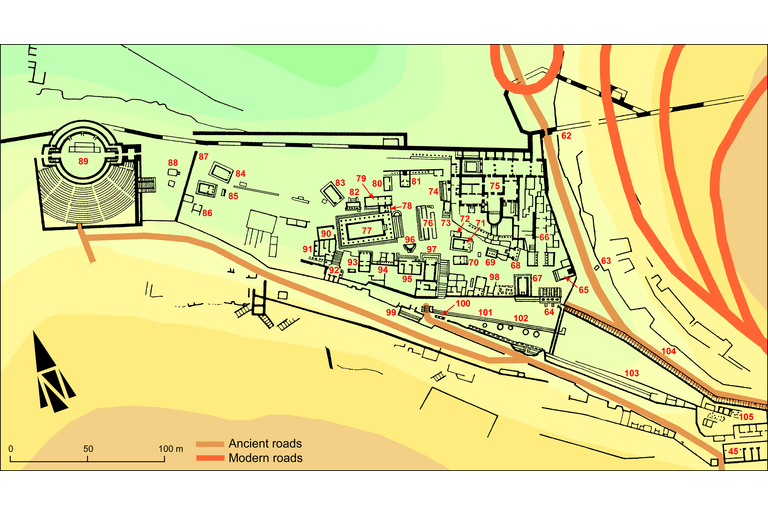Tithe of Aiglanor for Apollo
GVCyr049
Trismegistos ID: 738938
Source Description
Support
White marble stele with a plain moulding above and a feature on the face for which see commentary (total 0.45; 0.63;0.21; without cymatium 0.43; 0.58;0.19). A large part of the moulding is broken off in the middle.
Layout
Inscribed across both doors with a vacat in the interval.
Letters
0.03; archaic alphabet.
Place of Origin
Date
Perhaps sixth century B.C. (lettering)
Findspot
Found in 1925 in Cyrene pleiades; HGL : Sanctuary of Apollo, reused in the substructions of the Temple of Apollo (3rd phase).
Last recorded Location
Seen by C. Dobias-Lalou in 1983 at Cyrene pleiades; HGL : in the pronaos of the Temple of Apollo .
Text constituted from
Transcription from stone (CDL).
Bibliography
Oliverio, 1927 Oliverio, G., 1927, Campagna di scavi a Cirene nell'estate del 1925: II. Documenti epigrafici del santuario di Apollo, Africa Italiana1, 156-158 - see in bibliography , p. 156, whence SEG Supplementum Epigraphicum Graecum, Leiden, then Amsterdam, 1923-1971, then 1979- - see in bibliography , 9.78; Jeffery, 1961 Jeffery, L.H., 1961, The local scripts of archaic Greece: a study of the origin of the Greek alphabet and its development from the eighth to the fifth centuries B.C., Oxford - see in bibliography , pp. 320-324, whence SEG Supplementum Epigraphicum Graecum, Leiden, then Amsterdam, 1923-1971, then 1979- - see in bibliography , 20.722; Dobias-Lalou, 1970 Dobias-Lalou, C., 1970, Pour une chronologie des inscriptions archaïques de Cyrène, Revue de Philologie, de Littérature et d'Histoire Anciennes (RPh)ser. 3, 44, 228-256 - see in bibliography , n. 20; Marengo, 1991 Marengo, S.M., 1991, Sacerdoti di Apollo a Cirene. Nuove letture di iscrizioni già note, Annali della Facoltà di Lettere e Filosofia, Università di Macerata (AFLM)24, 489-512 - see in bibliography , pp. 496-500, whence SEG Supplementum Epigraphicum Graecum, Leiden, then Amsterdam, 1923-1971, then 1979- - see in bibliography , 41.1697.
Text
Apparatus
French translation
Aiglanor, le fils d'Antipatros m'a consacré comme dîme.
English translation
Aiglanor, the son of Antipatros dedicated me as a tithe.
Italian translation
Aiglanor, il figlio di Antipatros, mi ha dedicato come decima.
Commentary
When found, the stele had still red and blue paint, now disappeared. Oliverio did not comment on the sculpted feature of the face. It has been interpreted as two slightly open doors like on stelae from Asia Minor said 'with false doors'.
Alice Bencivenni's additional commentary.
On January 16th, 2009, at the Seminario Avanzato di Epigrafia Greca (Bologna), L. Gasperini delivered a paper entitled 'Per una rilettura integrale del donario cireneo S.E.G. IX 78', which has remained hitherto unpublished. Taking into account the inscription as a whole, he convincingly argued that the the v-shaped feature on the face was the recess into which a metal ὀβελός now lost was originally fixed. The tithe mentioned in the text would consist of this object and the idea of 'slightly open doors' should be dropped.
Metrical analysis. Although written on the stone, the final vowel of the verb at end of line 1 should be elided, so that the sentence fits exactly a pentameter. Marengo suggested a different analysis: preserving the hiatus, she proposed a feminine hemiepes, followed by a hemiepes. However, this view, relying on the inscription being cut on two lines, does not seem relevant in terms of phonetic use, even if isolated pentameters are rather rare. The verse-inscription enhances the high quality of the offering.
Creative Commons Attributions-NonCommercial 4.0 International License.
All citation, reuse or distribution of this work must contain a link back to DOI: http://doi.org/10.6092/UNIBO/IGCYRGVCYR and the filename (IGCyr000000 or GVCyr000), as well as the year of consultation.
